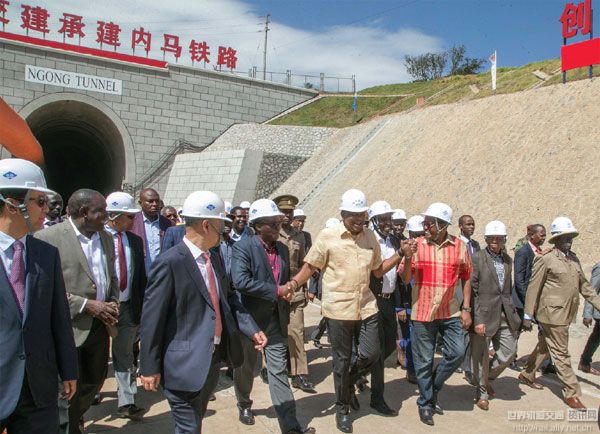Railway expected to spur manufacturing
2017-12-25 11:30:25Kenya's ambition to ramp up its manufacturing sector is on track as a project to expand the standard gauge railway takes shape.
Recently President Uhuru Kenyatta visited the project site, about half an hour from downtown Nairobi, that is part of the 120-kilometer Nairobi-Naivasha route. He expressed satisfaction with the progress of the project.

At the site, the first of three tunnels is under construction. It will be 7.15 km long and the second-largest tunnel in Africa. Altogether, the tunnels are expected to cost $179 million, and according to the Ministry of Transport, Infrastructure, Housing and Urban Development, work on the tunnel is on schedule and 25 percent complete.
Experts say the insistence by Kenyatta to have the rail project phase known as 2A, which consists of special economic zones and industrial parks, completed by June 2019 sends the right signal to investors who have been eyeing the manufacturing sector of East Africa's largest economy.
"Recent efforts by the government to modernize the transport sector and boost energy production while implementing policies to improve the business environment are definitely sending signals that Kenya is open for business," says Robert Kagiri, the director of the center for strategic policy management at Africa Policy Institute, a think tank in Nairobi.
In the World Bank's ease of doing business index, Kenya was ranked 80, moving up 12 places from the year before.
Gituro Wainaina, the former head of the Vision 2030 directorate secretariat - a department that oversees implementation of the country's development blueprint - says the steady development of the Nairobi-Naivasha route by the Chinese contractor gives confidence that modern infrastructure will eventually reach Kisumu and connect to Malaba, a town that borders on Uganda.
"This $1.5 billion modern infrastructure will revive business at the port of Kisumu, which is strategically placed for accessing the landlocked markets of Uganda, Rwanda and Burundi," says Wainaina, a scholar at the University of Nairobi's School of Business.
He believes the Nairobi-Naivasha route will address Kenya's ambitions to boost its manufacturing sector, which has been handicapped by underdeveloped transportation and energy sectors.
Naivasha is home to Olkaria, Africa's largest geothermal power station.
"With a stable power supply and no transmission charges, the government expects the area to attract textile factories," says Wainaina.
He says the town, which in past years has attracted low-cost labor into the flower farms there, will provide investors with easy access to workers.
Moreover, growth of the town will stimulate growth of the real estate sector and eventually help ease Nairobi's congestion, he says. Naivasha is an hour's drive from downtown Nairobi.
Wainaina says the newly launched Inland Container Depot promises to lower the cost of doing business.
"The inland port will boost efficiency of clearing imported goods, while at the same time pulling down the cost of goods, since the road distance has been reduced. This makes locally manufactured goods competitive," he says. "The last mile still has to be done by road, so I do not see the railway as a threat to the truckers."
The government has announced that the minimum cost of transporting a fully loaded 20 foot container is set at $198 for a minimum distance of 200km, and a maximum cost of $413 for the full distance between the port of Mombasa and the Inland Container Depot.
The port of Mombasa is expected to see a 7.6 percent year-on-year increase in cargo this year. The government says that over the past four years, annual cargo has increased from 21.9 million tons to 27.4 million tons.
